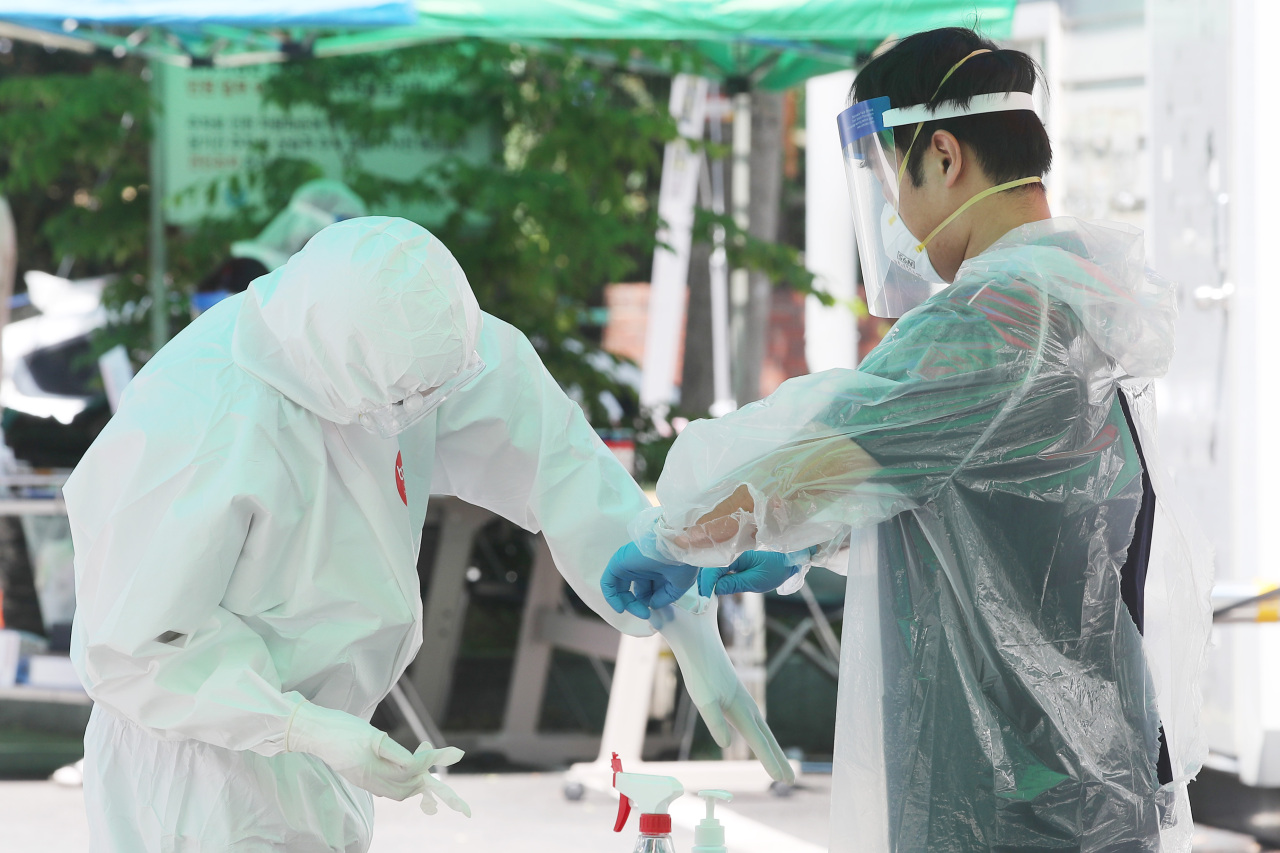
(Yonhap)
South Korea reported the largest number of new coronavirus cases in nearly two months Thursday due to an infection cluster at a logistics center in a city just west of Seoul, with more related cases in the metropolitan area feared to come.
The country identified 79 new cases, including 68 local infections, raising the total coronavirus caseload to 11,344, according to the Korea Centers for Disease Control and Prevention (KCDC).
It marked the largest daily increase in 53 days.
The increase was mostly attributable to mass infections at the distribution center in Bucheon. A total of 82 cases have been traced to the facility operated by e-commerce company Coupang as of 11:00 a.m.
Of the newly added infections, 67 cases were reported in the metropolitan area, which includes the surrounding Gyeonggi Province.
Health authorities are worried that more related cases tied to the Coupang logistics center are likely to follow, as tests are currently being carried out on some 4,000 potential cases.
So far, they have conducted virus tests on around 3,500 people over the cluster. Among them, around 2,800 tested negative for COVID-19, with others awaiting their results.
"In case of the Bucheon logistics center, nearly 70 people have been infected in three days since the first patient was identified," Kwon Joon-wook, deputy-general of KCDC, said in a separate briefing. "It is likely that the number of patients will increase further," he added.
Initial investigations showed the logistics center did not follow basic guidelines, including maintaining distance between people at its cafeteria. Authorities are finding out whether the cases from the center and Itaewon are connected.
The KCDC said it is important to follow basic sanitary guidelines, as it has also found traces of the COVID-19 virus on hats and shoes worn by the workers at the Bucheon center.
Health authorities are also looking into another Coupang distribution facility in Goyang, north of Seoul, where one employee has tested positive.
Given that there are many part-time workers in logistics centers, health authorities have requested such facilities across the country to keep track of all visitors.
They plan to inspect 1,321 logistics centers and 82 delivery terminals to check their virus response readiness.
Health authorities are also looking at cases tied to a call center in central Seoul. The center, which reported its first case on Tuesday, has seven COVID-19 infections so far.
After successfully controlling community spread due to strict social distancing and quick testing, the country has faced a large-scale cluster in the capital city. As of Thursday, 261 cases have been linked to Itaewon clubs and bars.
South Korea has seen ups and downs in the number of new cases, but infections mostly had been falling since the 81 cases reported on April 5. The number even reached just two earlier this month, before the infection cluster in the nightlife district of Itaewon in Seoul emerged early this month.
The country, which reported its first COVID-19 case, a Chinese person, on Jan. 20, once reported a daily increase of more than 900 cases in late February.
Early this month, South Korea eased its social distancing guidelines, with students, including kindergartners, returning to school in phases.
Health authorities, however, hinted that the country may have to return to strict social distancing again if average daily infections hover above 50 for a given period, the threshold to shift back to strict quarantine measures.
"We cannot make a decision based only on a figure from one day," Vice Health Minister Kim Gang-lip said during a daily briefing. "If we are capable of handling new patients within our medical system, there would be no huge benefits (of returning to the strict social distancing scheme)."
Kim, however, said South Korea will nevertheless continue to keep a watchful eye on the latest resurgence in new infections.
South Korea reported no new deaths Thursday, with the virus-related death toll at 269. The fatality rate came to 2.37 percent.
The total number of people released from quarantine after making full recoveries came to 10,340, up 45 from the previous day.
The number of imported cases, which used to be the top concern for South Korea in the battle against COVID-19, rose by 11. So far, the number of such cases has reached 1,232, with most of them being South Korean nationals.
The country carried out 15,790 additional COVID-19 tests Wednesday, raising the total number of people tested to 868,666.
Since late April, South Korea has required people who violate self-quarantine orders to wear location-tracking wristbands. It said a total of 74 bands have been applied so far. (Yonhap)

![[Exclusive] Korean military set to ban iPhones over 'security' concerns](http://res.heraldm.com/phpwas/restmb_idxmake.php?idx=645&simg=/content/image/2024/04/23/20240423050599_0.jpg&u=20240423183955)




![[Pressure points] Leggings in public: Fashion statement or social faux pas?](http://res.heraldm.com/phpwas/restmb_idxmake.php?idx=645&simg=/content/image/2024/04/23/20240423050669_0.jpg&u=)